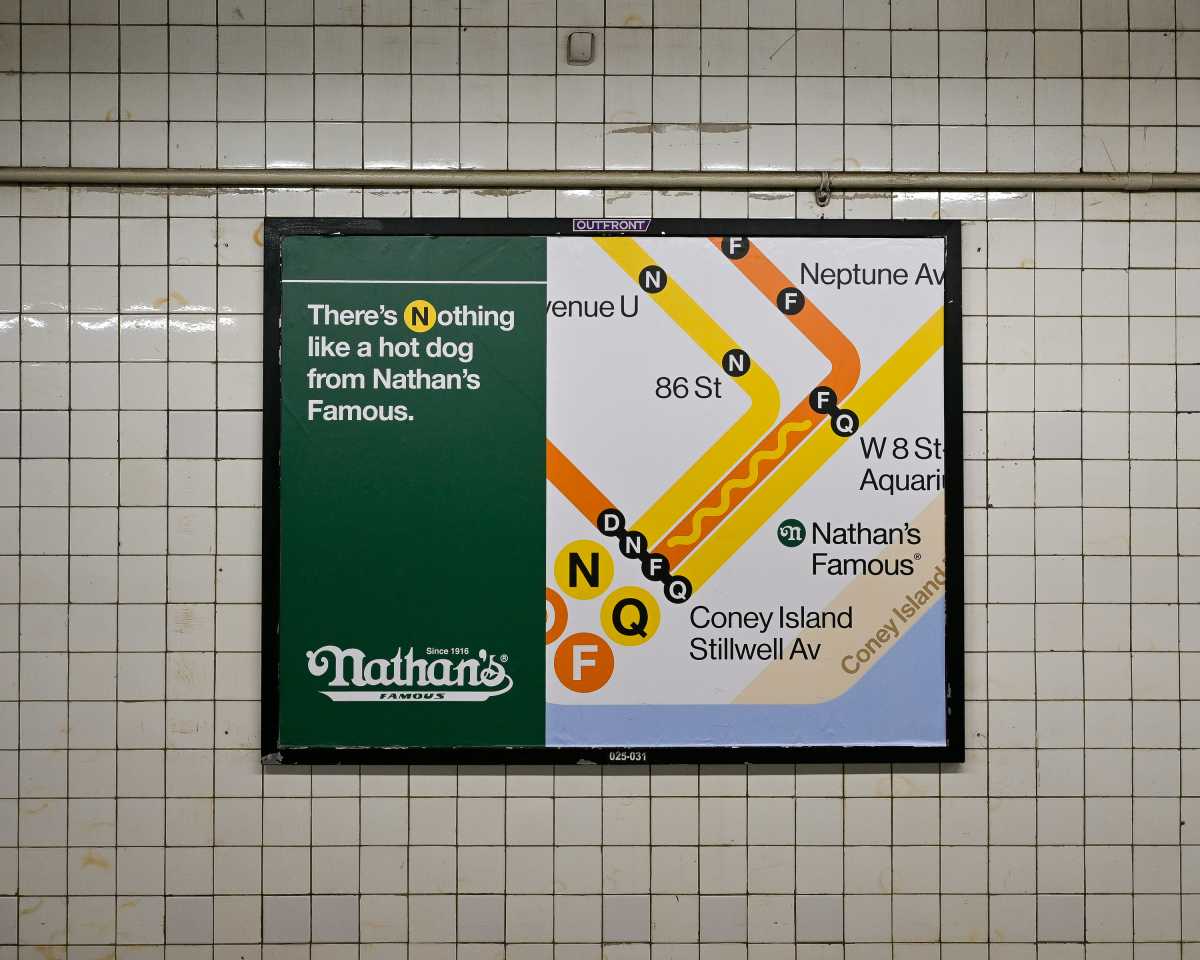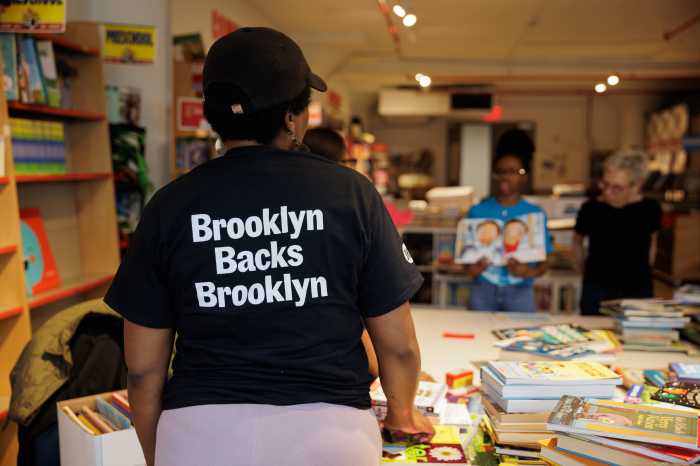BY SEAN EGAN | Making year-end lists is something of a difficult and arbitrary task, as comparing the relative quality of radically different films against each other becomes an exercise in trying to pick apples over oranges. That being said, 2014 seems to be an even more difficult year than most to write a “best of” list, as theatrical releases of all shapes, sizes and genres have been of an unusually high quality across the board. It seems a shame to only highlight a few of the best — but as it is, I present my personal (obsessively deliberated over) top ten films of 2014, followed by some thoughts and observations on many of the year’s excellent offerings that didn’t quite make the cut, yet are entirely worth your time.

(10) THE BABADOOK
This Australian horror export from first-time director Jennifer Kent is hands down the scariest movie of the year. An expertly executed chiller, “The Babadook” taps into primal phobias, and cannily uses the power of suggestion to unsettle. It also helps that Kent’s titular monster is one of the most ingenious and viscerally creepy horror creations in recent memory. Taut and terrifying, “The Babadook” is guaranteed leave you Baba-Spooked (forgive the pun, groan-worthy wordplay is just a coping mechanism to deal with how genuinely unnerving this movie is).
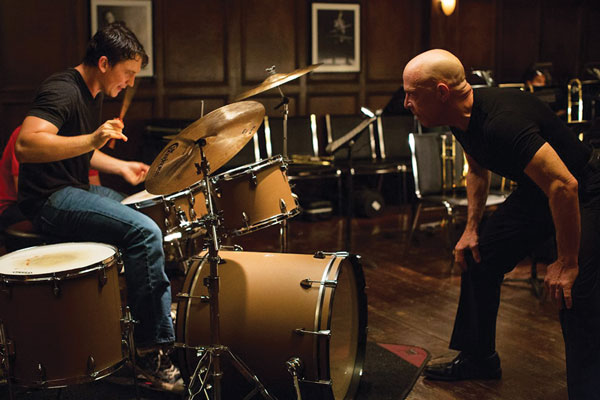
(9) WHIPLASH
Damien Chazelle’s little drama is so tightly wound, it essentially functions as a psychological thriller. Centering around a young jazz drummer’s (Miles Teller) obsessive quest to be one of the greats and his relationship with an emotionally abusive bandleader (J.K. Simmons) who demands perfection, “Whiplash” turns the screw and spirals in satisfying, unexpected ways. Simmons is larger than life, in a bravura performance, and the whole film builds to a fever pitch, culminating in a blood pumping, transfixing finale that’s one of the most breathtaking scenes of the year.
(8) LISTEN UP PHILIP
Alex Ross Perry’s deadpan dramadey focuses on Philip (Jason Schwartzman), published novelist and all-around asshole, as he burns bridges and destroys relationships while trying to get back on track creatively. It’s a movie that refuses to pander, offering a damning takedown of the self-important, white male artisté cliché — while remaining exceptionally humorous and witty throughout. Schwartzman turns in the best work of his career as Philip, giving him nuance and vulnerability while never sanding down his unlikable edges. As his long-suffering girlfriend Ashley, the exquisite Elizabeth Moss delivers one of the year’s best performances. Captured via Perry’s intimate direction (he favors extreme close ups and shoots in expressive 16mm), “Listen Up Philip” is a special, small-scale treat.
(7) SNOWPIERCER
This is by far the best, most ruthlessly inventive action movie of the year. Set in the not-too-distant future where the world has frozen over, rebellion and class warfare erupts aboard the self-sustaining train carrying the last of humanity. Director Bong Joon-ho structures the movie as if it was the world’s most exciting, Gilliam-esque video game, each progressive train car carrying new and exciting action set pieces or visual wonders. All the while he manages to imbue the film with a sneaky sense of humor, excellent performances (Tilda Swinton is a hoot and Chris Evans proves he has more to him than leading-man looks), and political messages for the age of the Environmentalist and Occupy movements — making “Snowpiercer” a smart, thrilling spectacle.
(6) THE GRAND BUDAPEST HOTEL
With the approach of every new feature, it seems a distinct possibility that Wes Anderson’s unmistakable style may collapse into self-parody and forced whimsy. Fortunately, Anderson defies the expectations of his doubters with his wonderful seventh picture, a comedy spanning multiple generations (and aspect ratios). The movie might be his most humorously irreverent, manicured and diorama-like to date, but the secret to its success is the unexpected vein of darkness and melancholy that runs through it, and its commitment to character. Funny, emotionally affecting and possessing a surprising depth, “The Grand Budapest Hotel” ranks amongst Anderson’s very best.
(5) UNDER THE SKIN
Jonathan Glazer’s darkly hypnotizing film is pretty difficult to describe, as there’s really nothing else quite like it. That’s part of its appeal — there’s a certain thrill to not knowing where a movie is going, and experiencing something totally new. It’s best to enter this movie knowing as little possible, and let it run its course unfettered by expectations (though Scarlett Johansson’s brilliantly cold and calculated performance deserves special mention). But be warned: “Under the Skin” is profoundly disturbing and intense in ways that very few movies aim to be, and even fewer are successful at. For those who make it through, it’s a visionary, visually sumptuous work of science fiction.
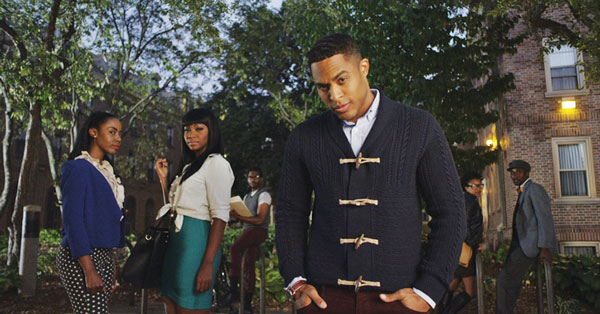
(4) DEAR WHITE PEOPLE
Writer/director Justin Simien’s campus dramedy is required viewing, more so than ever unfortunately, in light of recent events. Set on a faux-Ivy League campus as racial tension begins to boil, the movie takes everyone to task — from blatant bigots to well-meaning micro-aggressors — in order to expose the inherent injustices black people face in both the collegiate system and society at large. But “Dear White People” is not simply a means to preach a message. It also happens to be one of the most acutely observed character studies of the year. Focusing on four drastically different black students, the film captures each with an impressive amount of lived-in detail — particularly Tessa Thompson’s radical activist/filmmaker/DJ, Sam, and the shy, gay reporter, Lionel (played sympathetically by Tyler James Williams). Everything about Simien’s debut feels vital — from its funny, whip-smart script to its sure-handed direction (which sometimes recalls Wes Anderson) — and it’s exciting to see what he’ll do next.
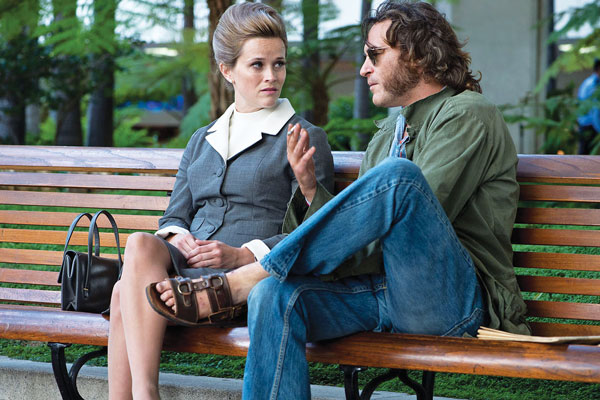
(3) INHERENT VICE
If “Gone Girl” represents the effectiveness of meticulously structured filmmaking, Paul Thomas Anderson’s “Inherent Vice” represents the opposite end of the spectrum — the exhilarating results that can be achieved by throwing caution (and structure) to the wind. Based on a Thomas Pynchon novel, “Inherent Vice” is a rambling, druggy, shaggy dog comedy by way of noir-ish P.I. narrative — but the plot is largely beside the point (and more than a little inscrutable). With Joaquin Phoenix’s stoner P.I. “Doc” Sportello at the center of the proceedings, Anderson presents viewers with a beautifully hazy, fully realized world to get lost in, populated by characters strange and strangely specific (like the never-better Josh Brolin’s Det. “Bigfoot”). It’s also quite possibly the funniest movie of the year. Visual gags abound, dialogue escalates absurdly, and reaction shots are deployed to devastating effect. If you’re on the wonky “Vice” wavelength, you’ll laugh till you’re in pain, and immediately want to revisit this wonderfully weird movie.
(2) GONE GIRL
Director David Fincher plays the role of a modern day Hitchcock, elevating a pulpy tale of infidelity, deceit and murder into a carefully constructed, first-rate mystery/thriller, and an accomplished work of art. Working from a sterling script by Gillian Flynn (adapting from her own novel), Fincher employs his signature meticulous compositions and cool-hued cinematography to ratchet up tension and construct a thoroughly engrossing mystery. The film’s real strength, however, lies in the way Fincher and Flynn seamlessly intertwine their tale with a nuanced examination of gender roles and identity. Boasting a powerhouse performance from Rosamund Pike (and an unexpectedly charismatic turn from Tyler Perry), a moody Trent Reznor and Atticus Ross score, and featuring more “Holy s**t!” plot twists than any other film per capita this year, “Gone Girl” is dark, intelligent and thought-provoking entertainment of the highest order.

(1) BOYHOOD
Was there really any other choice for the best film of 2014? While that may sound a tad presumptuous, writer/director Richards Linklater’s “Boyhood” would have been one for the books based on its conceit alone. The filming of a fictional narrative over the course of 12 years in order to track the physical and personal growth of the actors and their characters was an unprecedented strategy. That “Boyhood” wound up being this great almost seems like a bonus. Aided by an excellent cast and strengthened by his gentle yet elegant directorial style, Linklater constructed an instant-classic coming of age story like no other, capturing the universal in the specific, and finding the significance in the minutiae of daily life. No other movie’s ambition, both formally and artistically, was as great, and no other movie made excellence seem as effortless. In a career full of them, “Boyhood” is undoubtedly Linklater’s greatest masterpiece. It’s relatable, beautiful, emotionally satisfying and just about as perfect as a movie can hope to get.
HONORABLE MENTIONS
Outside of this top ten, plenty of other movies had a lot to offer. In terms of action-blockbusters, no movie could top “Edge of Tomorrow.” The criminally under-seen Tom Cruise vehicle was “Groundhog Day” by way of futuristic sci-fi — featuring hyper-kinetic action sequences, a wicked streak of dark humor and some of the most exciting use of 3D in a mainstream movie in years. And with “Guardians of the Galaxy,” Marvel scored not only the biggest commercial hit of the year, but also one of their most unique and artistically accomplished films to date. Helmed by Troma-veteran James Gunn, “Guardians” was a cinematic sugar rush packed with action, offbeat humor, endearing characters and a killer soundtrack.
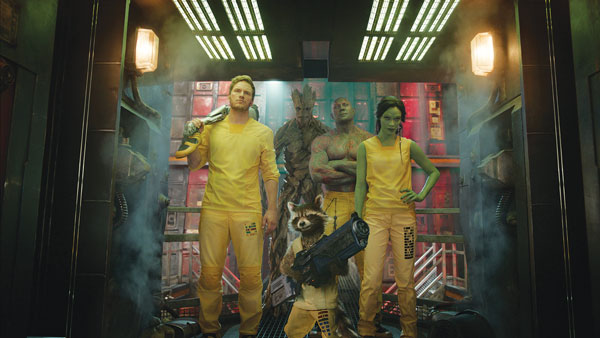
Directing team Phil Lord and Chris Miller continued their winning streak — via unlikely properties with both “The Lego Movie” and “22 Jump Street,” which were not only better than they had any right to be, but wound up being two hilarious and surprisingly heartfelt delights.
There was good to be found in smaller-scale films as well. Alejandro González Iñárritu’s “Birdman” was graced with an excellent ensemble cast (particularly Ed Norton and Michael Keaton), and the most stylish and showy direction of the year. In “Nightcrawler,” a malnourished-looking Jake Gyllenhaal turned one of the best performances of the year as the live-wire freelance videographer Louis Bloom, in a shockingly tense thriller about uh, media ethics. And Brendan Gleeson brought a devastating grace and humanity as a put-upon priest in John Michael McDonagh’s probing “Calvary.”
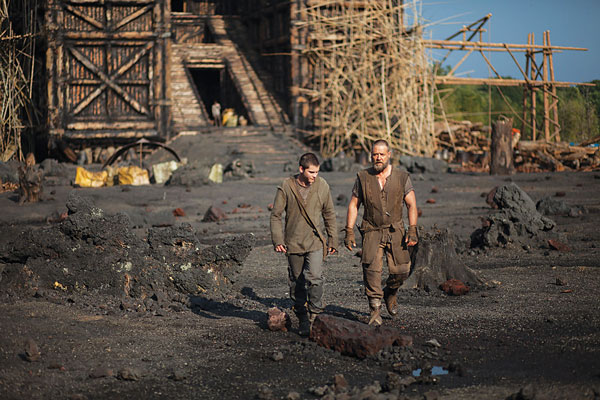
In 2014, a number of established auteurs built on their legacies by challenging themselves. Darren Aronofsky tried his hand at a biblical epic with “Noah,” and ended up with an excellent, if deeply weird and personal take on the story — half grandiose fantasy adventure (complete with giant rock monsters) and half bottle movie, and featuring one of the year’s most beautiful scenes in a lyrical retelling of the creation story.
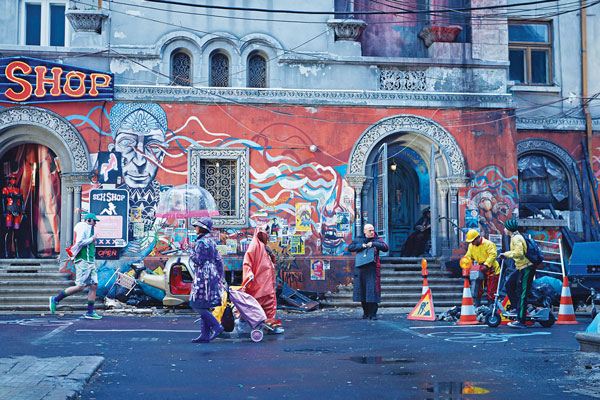
In “The Zero Theorem,” Terry Gilliam returned to a “Brazil”-like dystopian future for a visually overwhelming rumination on faith, anchored by a prickly Christoph Waltz performance (amongst the best in the actor’s filmography). Elsewhere, Jim Jarmusch brought his unmistakable rhythms to the vampire flick, humanizing the bloodsuckers in “Only Lovers Left Alive,” while Tim Burton brought some of his distinctive brand of unreality to the true-life tale, “Big Eyes.” And Kevin Smith’s polarizing horror-comedy “Tusk” is a movie that (love it or hate it) must be seen to be believed — perhaps the only film ever to be caught at the crossroads between Cronenbergian body horror, midnight b-movie schlock, Pink Panther homage and Smith’s own talky, blue-humor laden dialogue.
Perhaps most exciting were the indie debut features. Video artists Iain Forsyth and Jane Pollard made the leap to non-fiction feature filmmaking with “20,000 Days on Earth,” their stunning Nick Cave documentary that’s as effective as any depiction of the creative process has been captured on film. In the Iranian language, Lynchian vampire-western “A Girl Walks Home Alone at Night,” Ana Lily Amirpour proved she could synthesize her mad scientist array of influences into a cohesive whole, and create atmospheric images of disarming beauty all her own. Best of all, however, was the Israeli dark comedy (and hopeful sleeper-hit in the making) “Zero Motivation,” from writer/director Talya Lavie. Telling the story of a group of young women during their required service in the Israeli military, “Zero Motivation,” is a clever satire — a well-observed serio-comedy that’s as assured and original as anything released by more established directors — setting Lavie apart as a singular voice and a promising new talent.



















